HND Healthcare Practice: Law, Policy, and Ethical Practices Report
VerifiedAdded on 2023/01/18
|9
|2883
|1
Report
AI Summary
This report delves into the critical intersection of law, policy, and ethical practices within the UK's health and social care sector. It explores the nature of involvement with service users, emphasizing the importance of providing comfortable care and support to both patients and their families. The report highlights key legislation, including the Care Act 2014, the Human Rights Act 1998, the Equality Act 2010, and the Mental Capacity Act 2005, and analyzes their impact on healthcare practices, ensuring equal treatment and patient rights. It further examines the relationship between legislation, national policy, and ethical practices, emphasizing the significance of currency and compliance. The influence of organizational and national policies, professional standards, and codes of ethics on health and social care practices is also discussed, with a focus on promoting safeguarding and equality. The report concludes by examining how relevant legislation is implemented in health and safe environments and how policy and ethical considerations inform practice and impact unwarranted variations.
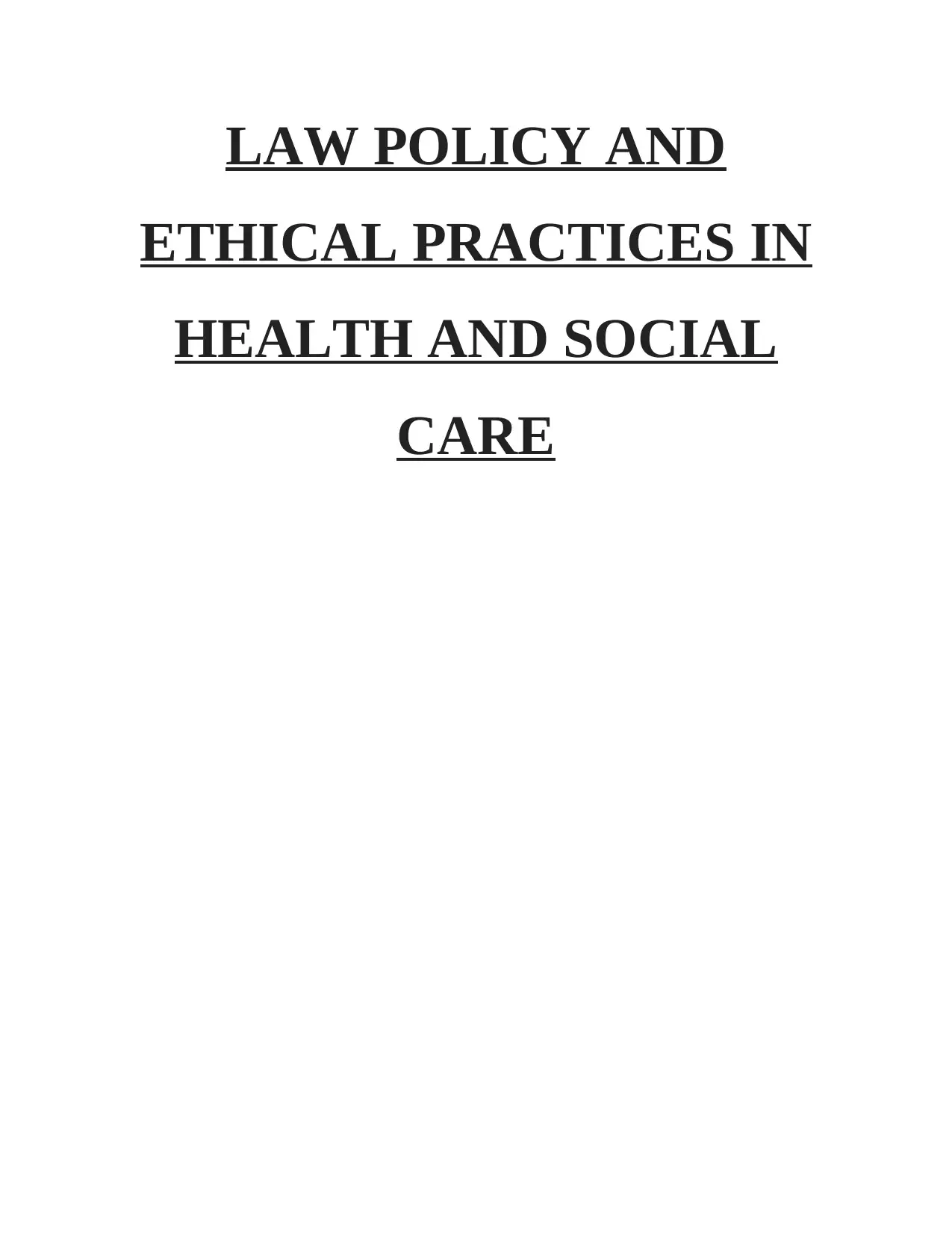
LAW POLICY AND
ETHICAL PRACTICES IN
HEALTH AND SOCIAL
CARE
ETHICAL PRACTICES IN
HEALTH AND SOCIAL
CARE
Paraphrase This Document
Need a fresh take? Get an instant paraphrase of this document with our AI Paraphraser
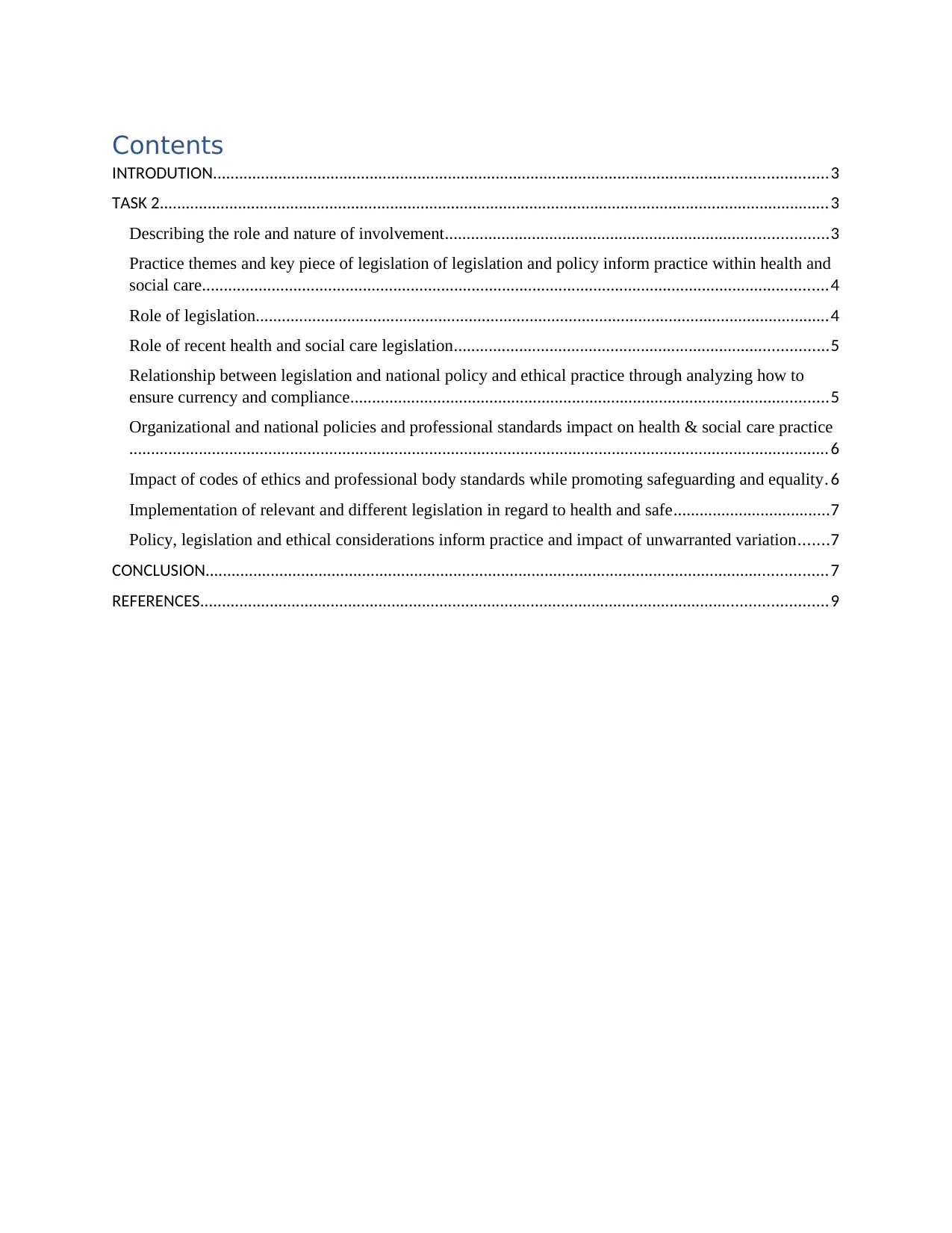
Contents
INTRODUTION.............................................................................................................................................3
TASK 2..........................................................................................................................................................3
Describing the role and nature of involvement........................................................................................3
Practice themes and key piece of legislation of legislation and policy inform practice within health and
social care................................................................................................................................................4
Role of legislation....................................................................................................................................4
Role of recent health and social care legislation......................................................................................5
Relationship between legislation and national policy and ethical practice through analyzing how to
ensure currency and compliance..............................................................................................................5
Organizational and national policies and professional standards impact on health & social care practice
.................................................................................................................................................................6
Impact of codes of ethics and professional body standards while promoting safeguarding and equality. 6
Implementation of relevant and different legislation in regard to health and safe....................................7
Policy, legislation and ethical considerations inform practice and impact of unwarranted variation.......7
CONCLUSION...............................................................................................................................................7
REFERENCES................................................................................................................................................9
INTRODUTION.............................................................................................................................................3
TASK 2..........................................................................................................................................................3
Describing the role and nature of involvement........................................................................................3
Practice themes and key piece of legislation of legislation and policy inform practice within health and
social care................................................................................................................................................4
Role of legislation....................................................................................................................................4
Role of recent health and social care legislation......................................................................................5
Relationship between legislation and national policy and ethical practice through analyzing how to
ensure currency and compliance..............................................................................................................5
Organizational and national policies and professional standards impact on health & social care practice
.................................................................................................................................................................6
Impact of codes of ethics and professional body standards while promoting safeguarding and equality. 6
Implementation of relevant and different legislation in regard to health and safe....................................7
Policy, legislation and ethical considerations inform practice and impact of unwarranted variation.......7
CONCLUSION...............................................................................................................................................7
REFERENCES................................................................................................................................................9
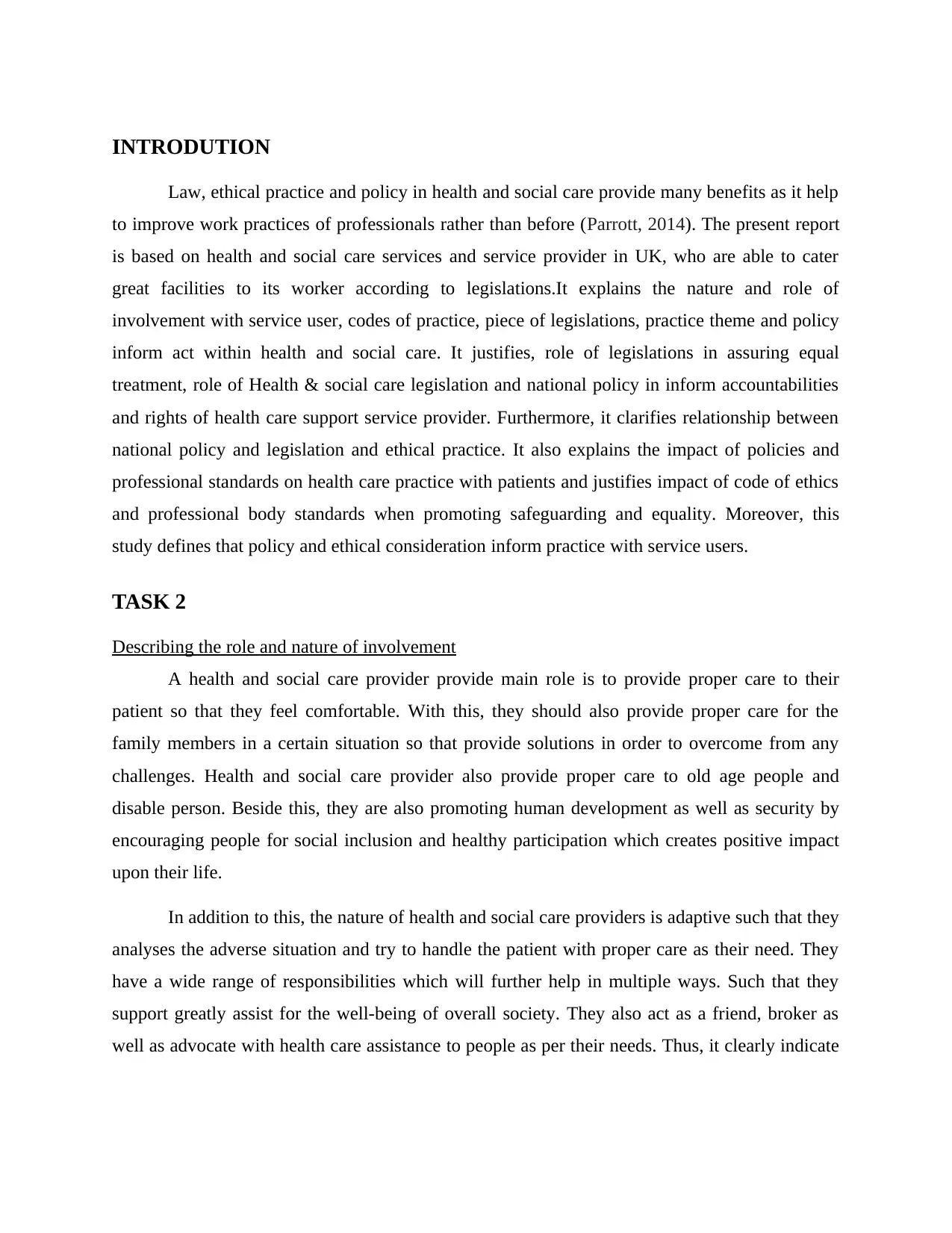
INTRODUTION
Law, ethical practice and policy in health and social care provide many benefits as it help
to improve work practices of professionals rather than before (Parrott, 2014). The present report
is based on health and social care services and service provider in UK, who are able to cater
great facilities to its worker according to legislations.It explains the nature and role of
involvement with service user, codes of practice, piece of legislations, practice theme and policy
inform act within health and social care. It justifies, role of legislations in assuring equal
treatment, role of Health & social care legislation and national policy in inform accountabilities
and rights of health care support service provider. Furthermore, it clarifies relationship between
national policy and legislation and ethical practice. It also explains the impact of policies and
professional standards on health care practice with patients and justifies impact of code of ethics
and professional body standards when promoting safeguarding and equality. Moreover, this
study defines that policy and ethical consideration inform practice with service users.
TASK 2
Describing the role and nature of involvement
A health and social care provider provide main role is to provide proper care to their
patient so that they feel comfortable. With this, they should also provide proper care for the
family members in a certain situation so that provide solutions in order to overcome from any
challenges. Health and social care provider also provide proper care to old age people and
disable person. Beside this, they are also promoting human development as well as security by
encouraging people for social inclusion and healthy participation which creates positive impact
upon their life.
In addition to this, the nature of health and social care providers is adaptive such that they
analyses the adverse situation and try to handle the patient with proper care as their need. They
have a wide range of responsibilities which will further help in multiple ways. Such that they
support greatly assist for the well-being of overall society. They also act as a friend, broker as
well as advocate with health care assistance to people as per their needs. Thus, it clearly indicate
Law, ethical practice and policy in health and social care provide many benefits as it help
to improve work practices of professionals rather than before (Parrott, 2014). The present report
is based on health and social care services and service provider in UK, who are able to cater
great facilities to its worker according to legislations.It explains the nature and role of
involvement with service user, codes of practice, piece of legislations, practice theme and policy
inform act within health and social care. It justifies, role of legislations in assuring equal
treatment, role of Health & social care legislation and national policy in inform accountabilities
and rights of health care support service provider. Furthermore, it clarifies relationship between
national policy and legislation and ethical practice. It also explains the impact of policies and
professional standards on health care practice with patients and justifies impact of code of ethics
and professional body standards when promoting safeguarding and equality. Moreover, this
study defines that policy and ethical consideration inform practice with service users.
TASK 2
Describing the role and nature of involvement
A health and social care provider provide main role is to provide proper care to their
patient so that they feel comfortable. With this, they should also provide proper care for the
family members in a certain situation so that provide solutions in order to overcome from any
challenges. Health and social care provider also provide proper care to old age people and
disable person. Beside this, they are also promoting human development as well as security by
encouraging people for social inclusion and healthy participation which creates positive impact
upon their life.
In addition to this, the nature of health and social care providers is adaptive such that they
analyses the adverse situation and try to handle the patient with proper care as their need. They
have a wide range of responsibilities which will further help in multiple ways. Such that they
support greatly assist for the well-being of overall society. They also act as a friend, broker as
well as advocate with health care assistance to people as per their needs. Thus, it clearly indicate
⊘ This is a preview!⊘
Do you want full access?
Subscribe today to unlock all pages.

Trusted by 1+ million students worldwide
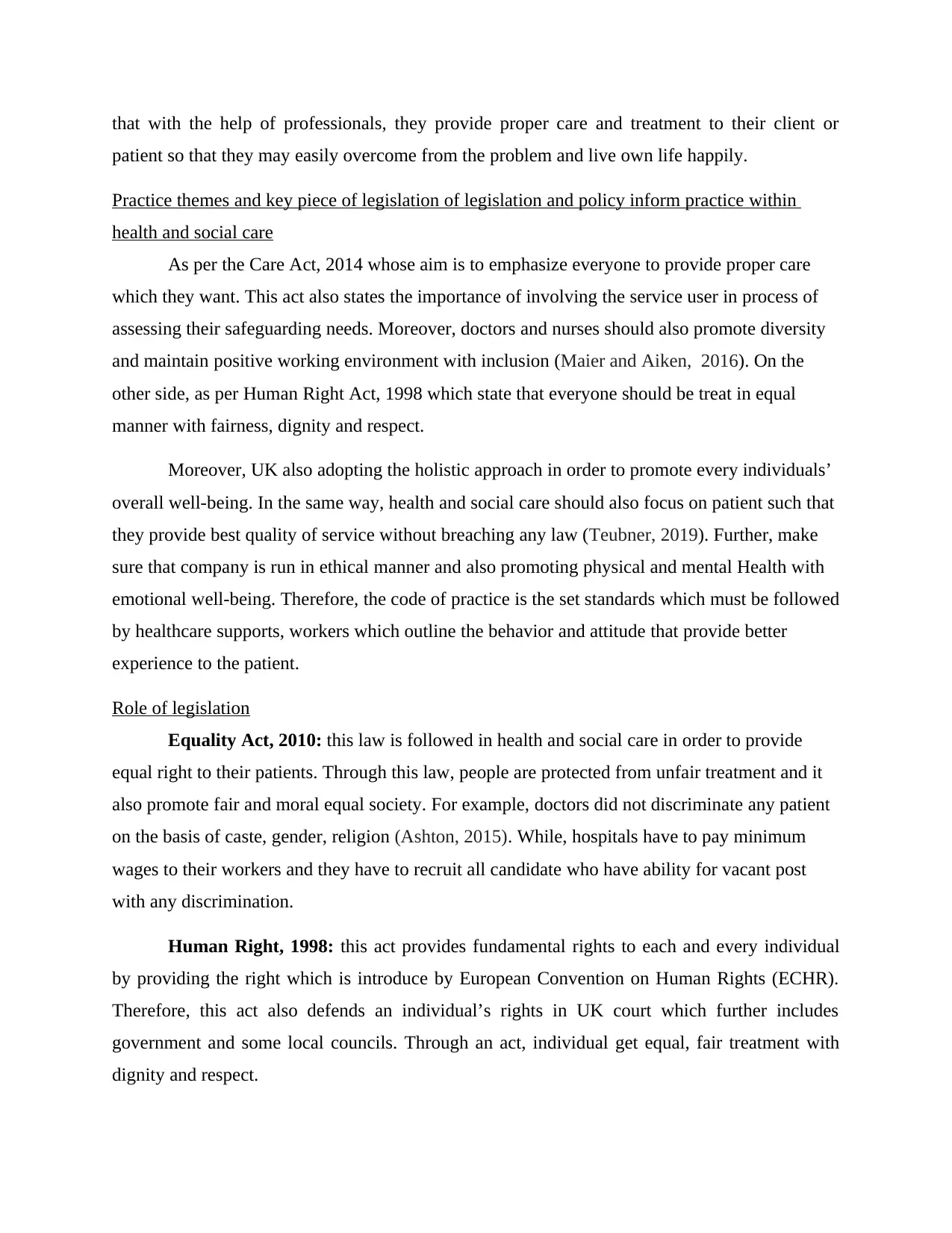
that with the help of professionals, they provide proper care and treatment to their client or
patient so that they may easily overcome from the problem and live own life happily.
Practice themes and key piece of legislation of legislation and policy inform practice within
health and social care
As per the Care Act, 2014 whose aim is to emphasize everyone to provide proper care
which they want. This act also states the importance of involving the service user in process of
assessing their safeguarding needs. Moreover, doctors and nurses should also promote diversity
and maintain positive working environment with inclusion (Maier and Aiken, 2016). On the
other side, as per Human Right Act, 1998 which state that everyone should be treat in equal
manner with fairness, dignity and respect.
Moreover, UK also adopting the holistic approach in order to promote every individuals’
overall well-being. In the same way, health and social care should also focus on patient such that
they provide best quality of service without breaching any law (Teubner, 2019). Further, make
sure that company is run in ethical manner and also promoting physical and mental Health with
emotional well-being. Therefore, the code of practice is the set standards which must be followed
by healthcare supports, workers which outline the behavior and attitude that provide better
experience to the patient.
Role of legislation
Equality Act, 2010: this law is followed in health and social care in order to provide
equal right to their patients. Through this law, people are protected from unfair treatment and it
also promote fair and moral equal society. For example, doctors did not discriminate any patient
on the basis of caste, gender, religion (Ashton, 2015). While, hospitals have to pay minimum
wages to their workers and they have to recruit all candidate who have ability for vacant post
with any discrimination.
Human Right, 1998: this act provides fundamental rights to each and every individual
by providing the right which is introduce by European Convention on Human Rights (ECHR).
Therefore, this act also defends an individual’s rights in UK court which further includes
government and some local councils. Through an act, individual get equal, fair treatment with
dignity and respect.
patient so that they may easily overcome from the problem and live own life happily.
Practice themes and key piece of legislation of legislation and policy inform practice within
health and social care
As per the Care Act, 2014 whose aim is to emphasize everyone to provide proper care
which they want. This act also states the importance of involving the service user in process of
assessing their safeguarding needs. Moreover, doctors and nurses should also promote diversity
and maintain positive working environment with inclusion (Maier and Aiken, 2016). On the
other side, as per Human Right Act, 1998 which state that everyone should be treat in equal
manner with fairness, dignity and respect.
Moreover, UK also adopting the holistic approach in order to promote every individuals’
overall well-being. In the same way, health and social care should also focus on patient such that
they provide best quality of service without breaching any law (Teubner, 2019). Further, make
sure that company is run in ethical manner and also promoting physical and mental Health with
emotional well-being. Therefore, the code of practice is the set standards which must be followed
by healthcare supports, workers which outline the behavior and attitude that provide better
experience to the patient.
Role of legislation
Equality Act, 2010: this law is followed in health and social care in order to provide
equal right to their patients. Through this law, people are protected from unfair treatment and it
also promote fair and moral equal society. For example, doctors did not discriminate any patient
on the basis of caste, gender, religion (Ashton, 2015). While, hospitals have to pay minimum
wages to their workers and they have to recruit all candidate who have ability for vacant post
with any discrimination.
Human Right, 1998: this act provides fundamental rights to each and every individual
by providing the right which is introduce by European Convention on Human Rights (ECHR).
Therefore, this act also defends an individual’s rights in UK court which further includes
government and some local councils. Through an act, individual get equal, fair treatment with
dignity and respect.
Paraphrase This Document
Need a fresh take? Get an instant paraphrase of this document with our AI Paraphraser
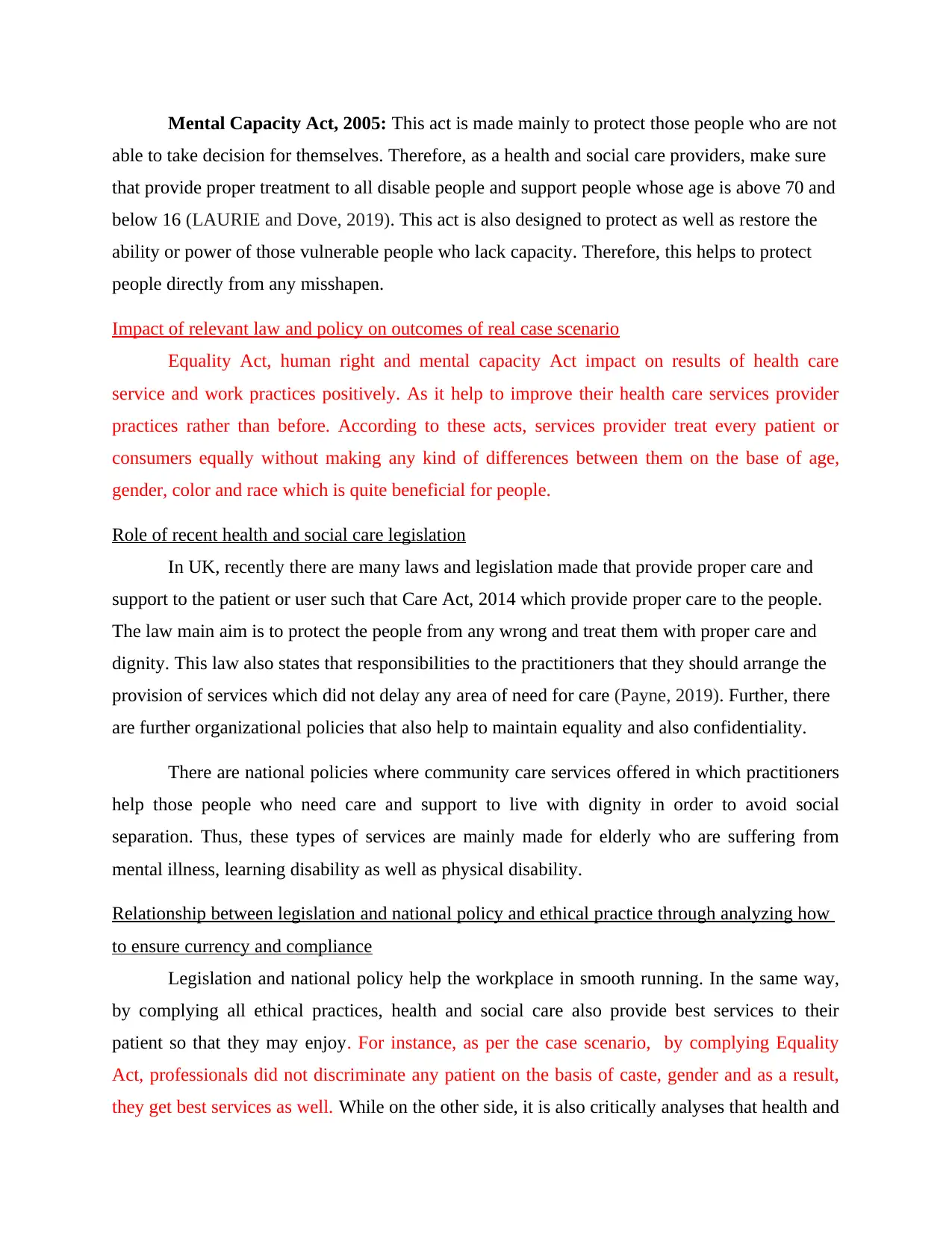
Mental Capacity Act, 2005: This act is made mainly to protect those people who are not
able to take decision for themselves. Therefore, as a health and social care providers, make sure
that provide proper treatment to all disable people and support people whose age is above 70 and
below 16 (LAURIE and Dove, 2019). This act is also designed to protect as well as restore the
ability or power of those vulnerable people who lack capacity. Therefore, this helps to protect
people directly from any misshapen.
Impact of relevant law and policy on outcomes of real case scenario
Equality Act, human right and mental capacity Act impact on results of health care
service and work practices positively. As it help to improve their health care services provider
practices rather than before. According to these acts, services provider treat every patient or
consumers equally without making any kind of differences between them on the base of age,
gender, color and race which is quite beneficial for people.
Role of recent health and social care legislation
In UK, recently there are many laws and legislation made that provide proper care and
support to the patient or user such that Care Act, 2014 which provide proper care to the people.
The law main aim is to protect the people from any wrong and treat them with proper care and
dignity. This law also states that responsibilities to the practitioners that they should arrange the
provision of services which did not delay any area of need for care (Payne, 2019). Further, there
are further organizational policies that also help to maintain equality and also confidentiality.
There are national policies where community care services offered in which practitioners
help those people who need care and support to live with dignity in order to avoid social
separation. Thus, these types of services are mainly made for elderly who are suffering from
mental illness, learning disability as well as physical disability.
Relationship between legislation and national policy and ethical practice through analyzing how
to ensure currency and compliance
Legislation and national policy help the workplace in smooth running. In the same way,
by complying all ethical practices, health and social care also provide best services to their
patient so that they may enjoy. For instance, as per the case scenario, by complying Equality
Act, professionals did not discriminate any patient on the basis of caste, gender and as a result,
they get best services as well. While on the other side, it is also critically analyses that health and
able to take decision for themselves. Therefore, as a health and social care providers, make sure
that provide proper treatment to all disable people and support people whose age is above 70 and
below 16 (LAURIE and Dove, 2019). This act is also designed to protect as well as restore the
ability or power of those vulnerable people who lack capacity. Therefore, this helps to protect
people directly from any misshapen.
Impact of relevant law and policy on outcomes of real case scenario
Equality Act, human right and mental capacity Act impact on results of health care
service and work practices positively. As it help to improve their health care services provider
practices rather than before. According to these acts, services provider treat every patient or
consumers equally without making any kind of differences between them on the base of age,
gender, color and race which is quite beneficial for people.
Role of recent health and social care legislation
In UK, recently there are many laws and legislation made that provide proper care and
support to the patient or user such that Care Act, 2014 which provide proper care to the people.
The law main aim is to protect the people from any wrong and treat them with proper care and
dignity. This law also states that responsibilities to the practitioners that they should arrange the
provision of services which did not delay any area of need for care (Payne, 2019). Further, there
are further organizational policies that also help to maintain equality and also confidentiality.
There are national policies where community care services offered in which practitioners
help those people who need care and support to live with dignity in order to avoid social
separation. Thus, these types of services are mainly made for elderly who are suffering from
mental illness, learning disability as well as physical disability.
Relationship between legislation and national policy and ethical practice through analyzing how
to ensure currency and compliance
Legislation and national policy help the workplace in smooth running. In the same way,
by complying all ethical practices, health and social care also provide best services to their
patient so that they may enjoy. For instance, as per the case scenario, by complying Equality
Act, professionals did not discriminate any patient on the basis of caste, gender and as a result,
they get best services as well. While on the other side, it is also critically analyses that health and
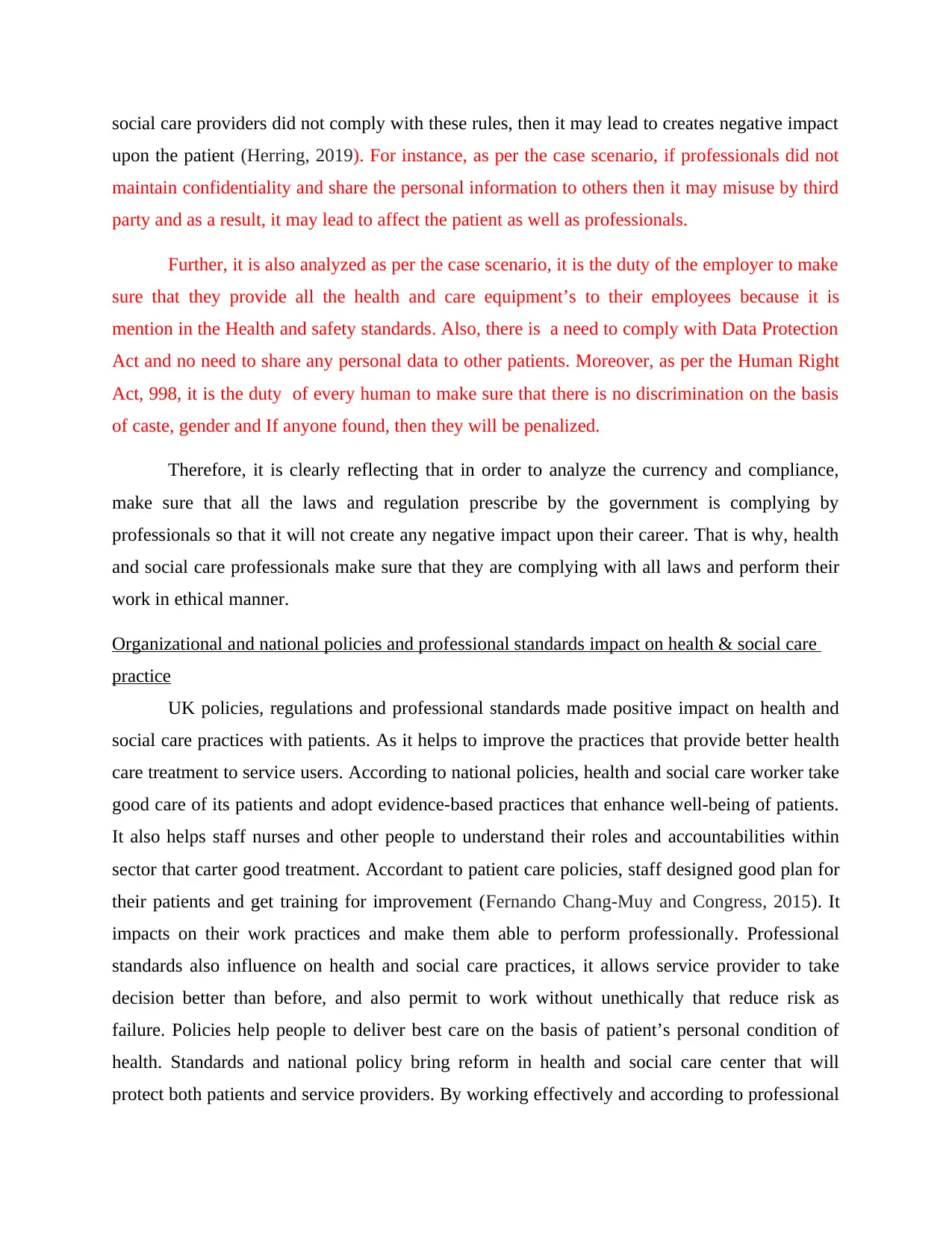
social care providers did not comply with these rules, then it may lead to creates negative impact
upon the patient (Herring, 2019). For instance, as per the case scenario, if professionals did not
maintain confidentiality and share the personal information to others then it may misuse by third
party and as a result, it may lead to affect the patient as well as professionals.
Further, it is also analyzed as per the case scenario, it is the duty of the employer to make
sure that they provide all the health and care equipment’s to their employees because it is
mention in the Health and safety standards. Also, there is a need to comply with Data Protection
Act and no need to share any personal data to other patients. Moreover, as per the Human Right
Act, 998, it is the duty of every human to make sure that there is no discrimination on the basis
of caste, gender and If anyone found, then they will be penalized.
Therefore, it is clearly reflecting that in order to analyze the currency and compliance,
make sure that all the laws and regulation prescribe by the government is complying by
professionals so that it will not create any negative impact upon their career. That is why, health
and social care professionals make sure that they are complying with all laws and perform their
work in ethical manner.
Organizational and national policies and professional standards impact on health & social care
practice
UK policies, regulations and professional standards made positive impact on health and
social care practices with patients. As it helps to improve the practices that provide better health
care treatment to service users. According to national policies, health and social care worker take
good care of its patients and adopt evidence-based practices that enhance well-being of patients.
It also helps staff nurses and other people to understand their roles and accountabilities within
sector that carter good treatment. Accordant to patient care policies, staff designed good plan for
their patients and get training for improvement (Fernando Chang-Muy and Congress, 2015). It
impacts on their work practices and make them able to perform professionally. Professional
standards also influence on health and social care practices, it allows service provider to take
decision better than before, and also permit to work without unethically that reduce risk as
failure. Policies help people to deliver best care on the basis of patient’s personal condition of
health. Standards and national policy bring reform in health and social care center that will
protect both patients and service providers. By working effectively and according to professional
upon the patient (Herring, 2019). For instance, as per the case scenario, if professionals did not
maintain confidentiality and share the personal information to others then it may misuse by third
party and as a result, it may lead to affect the patient as well as professionals.
Further, it is also analyzed as per the case scenario, it is the duty of the employer to make
sure that they provide all the health and care equipment’s to their employees because it is
mention in the Health and safety standards. Also, there is a need to comply with Data Protection
Act and no need to share any personal data to other patients. Moreover, as per the Human Right
Act, 998, it is the duty of every human to make sure that there is no discrimination on the basis
of caste, gender and If anyone found, then they will be penalized.
Therefore, it is clearly reflecting that in order to analyze the currency and compliance,
make sure that all the laws and regulation prescribe by the government is complying by
professionals so that it will not create any negative impact upon their career. That is why, health
and social care professionals make sure that they are complying with all laws and perform their
work in ethical manner.
Organizational and national policies and professional standards impact on health & social care
practice
UK policies, regulations and professional standards made positive impact on health and
social care practices with patients. As it helps to improve the practices that provide better health
care treatment to service users. According to national policies, health and social care worker take
good care of its patients and adopt evidence-based practices that enhance well-being of patients.
It also helps staff nurses and other people to understand their roles and accountabilities within
sector that carter good treatment. Accordant to patient care policies, staff designed good plan for
their patients and get training for improvement (Fernando Chang-Muy and Congress, 2015). It
impacts on their work practices and make them able to perform professionally. Professional
standards also influence on health and social care practices, it allows service provider to take
decision better than before, and also permit to work without unethically that reduce risk as
failure. Policies help people to deliver best care on the basis of patient’s personal condition of
health. Standards and national policy bring reform in health and social care center that will
protect both patients and service providers. By working effectively and according to professional
⊘ This is a preview!⊘
Do you want full access?
Subscribe today to unlock all pages.

Trusted by 1+ million students worldwide
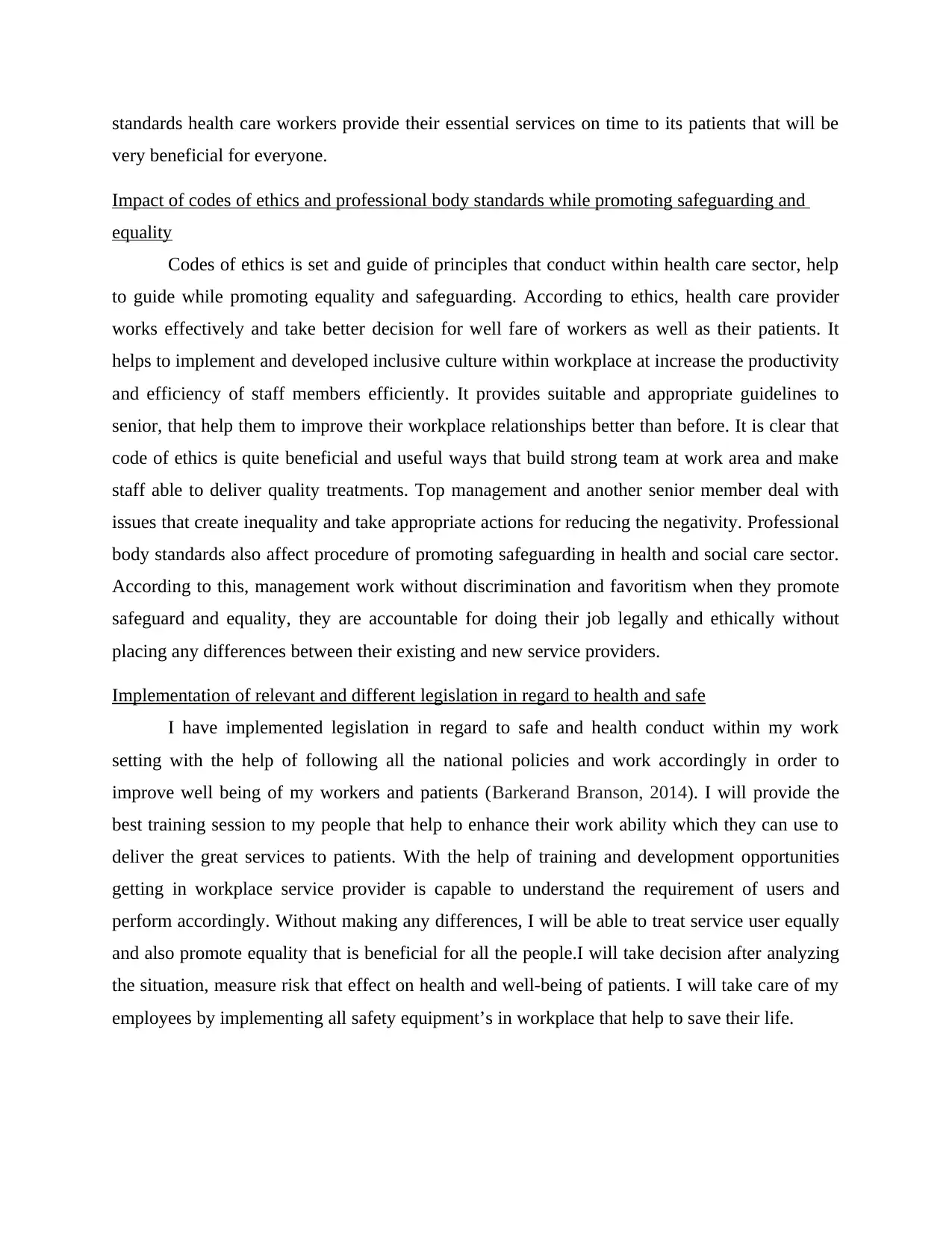
standards health care workers provide their essential services on time to its patients that will be
very beneficial for everyone.
Impact of codes of ethics and professional body standards while promoting safeguarding and
equality
Codes of ethics is set and guide of principles that conduct within health care sector, help
to guide while promoting equality and safeguarding. According to ethics, health care provider
works effectively and take better decision for well fare of workers as well as their patients. It
helps to implement and developed inclusive culture within workplace at increase the productivity
and efficiency of staff members efficiently. It provides suitable and appropriate guidelines to
senior, that help them to improve their workplace relationships better than before. It is clear that
code of ethics is quite beneficial and useful ways that build strong team at work area and make
staff able to deliver quality treatments. Top management and another senior member deal with
issues that create inequality and take appropriate actions for reducing the negativity. Professional
body standards also affect procedure of promoting safeguarding in health and social care sector.
According to this, management work without discrimination and favoritism when they promote
safeguard and equality, they are accountable for doing their job legally and ethically without
placing any differences between their existing and new service providers.
Implementation of relevant and different legislation in regard to health and safe
I have implemented legislation in regard to safe and health conduct within my work
setting with the help of following all the national policies and work accordingly in order to
improve well being of my workers and patients (Barkerand Branson, 2014). I will provide the
best training session to my people that help to enhance their work ability which they can use to
deliver the great services to patients. With the help of training and development opportunities
getting in workplace service provider is capable to understand the requirement of users and
perform accordingly. Without making any differences, I will be able to treat service user equally
and also promote equality that is beneficial for all the people.I will take decision after analyzing
the situation, measure risk that effect on health and well-being of patients. I will take care of my
employees by implementing all safety equipment’s in workplace that help to save their life.
very beneficial for everyone.
Impact of codes of ethics and professional body standards while promoting safeguarding and
equality
Codes of ethics is set and guide of principles that conduct within health care sector, help
to guide while promoting equality and safeguarding. According to ethics, health care provider
works effectively and take better decision for well fare of workers as well as their patients. It
helps to implement and developed inclusive culture within workplace at increase the productivity
and efficiency of staff members efficiently. It provides suitable and appropriate guidelines to
senior, that help them to improve their workplace relationships better than before. It is clear that
code of ethics is quite beneficial and useful ways that build strong team at work area and make
staff able to deliver quality treatments. Top management and another senior member deal with
issues that create inequality and take appropriate actions for reducing the negativity. Professional
body standards also affect procedure of promoting safeguarding in health and social care sector.
According to this, management work without discrimination and favoritism when they promote
safeguard and equality, they are accountable for doing their job legally and ethically without
placing any differences between their existing and new service providers.
Implementation of relevant and different legislation in regard to health and safe
I have implemented legislation in regard to safe and health conduct within my work
setting with the help of following all the national policies and work accordingly in order to
improve well being of my workers and patients (Barkerand Branson, 2014). I will provide the
best training session to my people that help to enhance their work ability which they can use to
deliver the great services to patients. With the help of training and development opportunities
getting in workplace service provider is capable to understand the requirement of users and
perform accordingly. Without making any differences, I will be able to treat service user equally
and also promote equality that is beneficial for all the people.I will take decision after analyzing
the situation, measure risk that effect on health and well-being of patients. I will take care of my
employees by implementing all safety equipment’s in workplace that help to save their life.
Paraphrase This Document
Need a fresh take? Get an instant paraphrase of this document with our AI Paraphraser
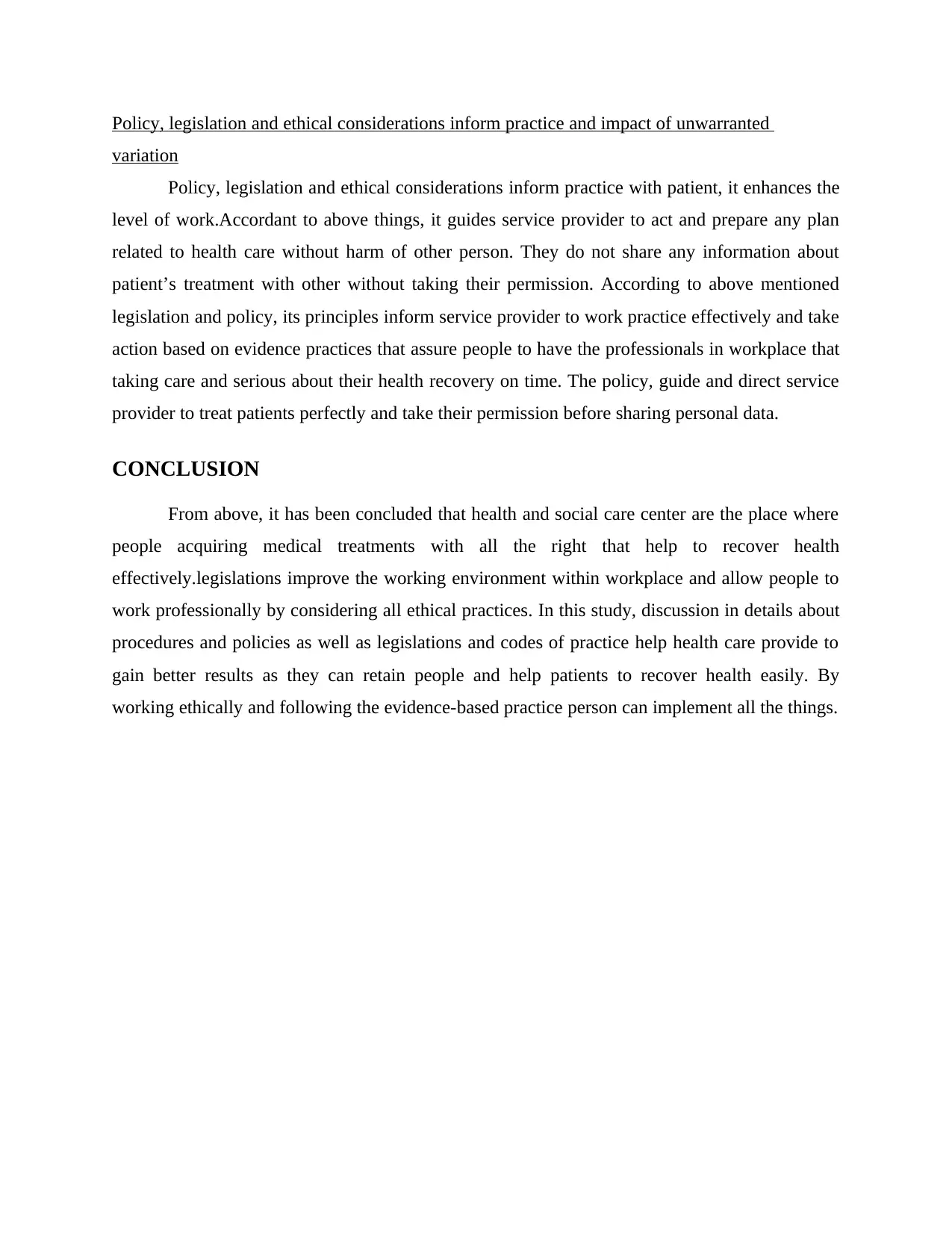
Policy, legislation and ethical considerations inform practice and impact of unwarranted
variation
Policy, legislation and ethical considerations inform practice with patient, it enhances the
level of work.Accordant to above things, it guides service provider to act and prepare any plan
related to health care without harm of other person. They do not share any information about
patient’s treatment with other without taking their permission. According to above mentioned
legislation and policy, its principles inform service provider to work practice effectively and take
action based on evidence practices that assure people to have the professionals in workplace that
taking care and serious about their health recovery on time. The policy, guide and direct service
provider to treat patients perfectly and take their permission before sharing personal data.
CONCLUSION
From above, it has been concluded that health and social care center are the place where
people acquiring medical treatments with all the right that help to recover health
effectively.legislations improve the working environment within workplace and allow people to
work professionally by considering all ethical practices. In this study, discussion in details about
procedures and policies as well as legislations and codes of practice help health care provide to
gain better results as they can retain people and help patients to recover health easily. By
working ethically and following the evidence-based practice person can implement all the things.
variation
Policy, legislation and ethical considerations inform practice with patient, it enhances the
level of work.Accordant to above things, it guides service provider to act and prepare any plan
related to health care without harm of other person. They do not share any information about
patient’s treatment with other without taking their permission. According to above mentioned
legislation and policy, its principles inform service provider to work practice effectively and take
action based on evidence practices that assure people to have the professionals in workplace that
taking care and serious about their health recovery on time. The policy, guide and direct service
provider to treat patients perfectly and take their permission before sharing personal data.
CONCLUSION
From above, it has been concluded that health and social care center are the place where
people acquiring medical treatments with all the right that help to recover health
effectively.legislations improve the working environment within workplace and allow people to
work professionally by considering all ethical practices. In this study, discussion in details about
procedures and policies as well as legislations and codes of practice help health care provide to
gain better results as they can retain people and help patients to recover health easily. By
working ethically and following the evidence-based practice person can implement all the things.
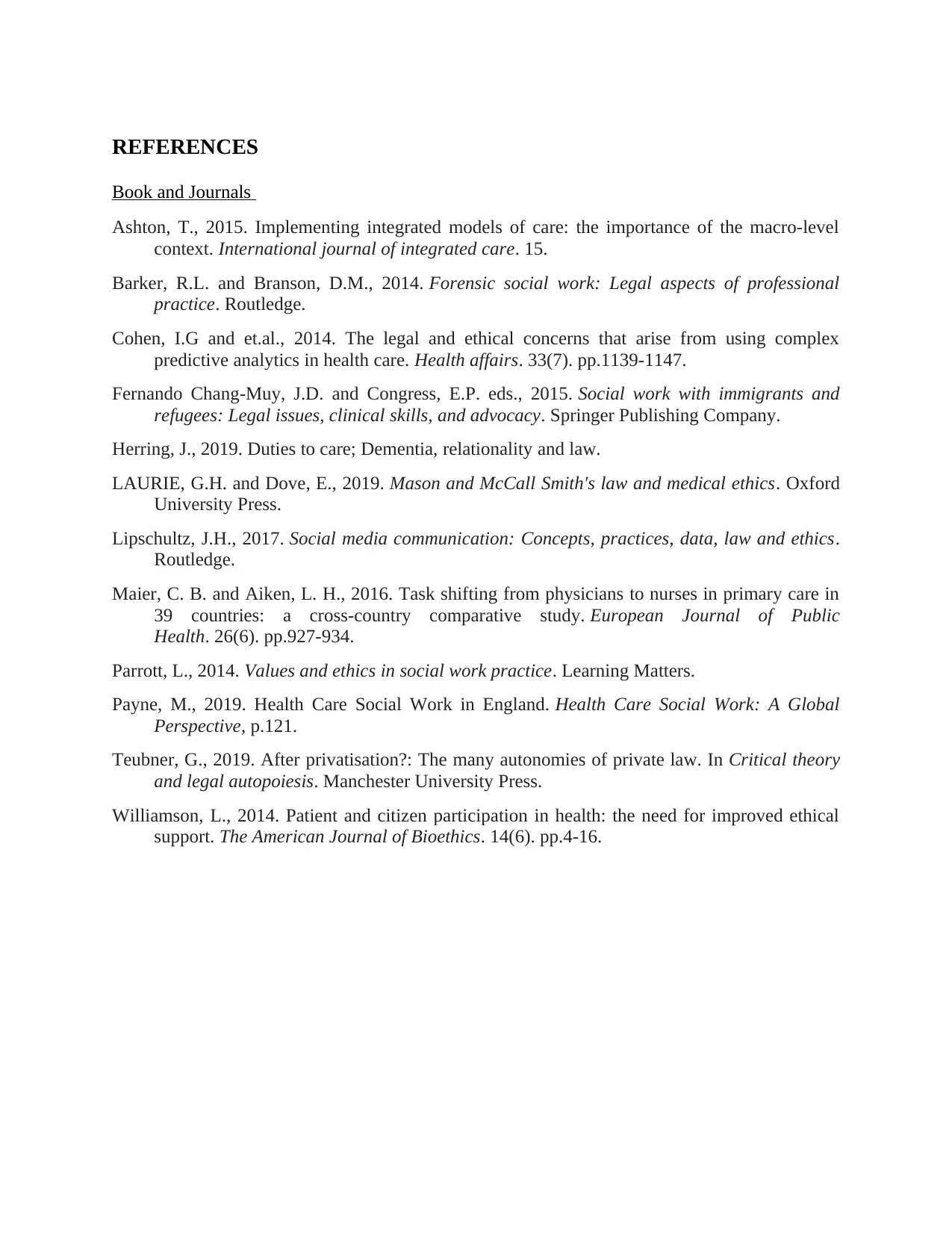
REFERENCES
Book and Journals
Ashton, T., 2015. Implementing integrated models of care: the importance of the macro-level
context. International journal of integrated care. 15.
Barker, R.L. and Branson, D.M., 2014. Forensic social work: Legal aspects of professional
practice. Routledge.
Cohen, I.G and et.al., 2014. The legal and ethical concerns that arise from using complex
predictive analytics in health care. Health affairs. 33(7). pp.1139-1147.
Fernando Chang-Muy, J.D. and Congress, E.P. eds., 2015. Social work with immigrants and
refugees: Legal issues, clinical skills, and advocacy. Springer Publishing Company.
Herring, J., 2019. Duties to care; Dementia, relationality and law.
LAURIE, G.H. and Dove, E., 2019. Mason and McCall Smith's law and medical ethics. Oxford
University Press.
Lipschultz, J.H., 2017. Social media communication: Concepts, practices, data, law and ethics.
Routledge.
Maier, C. B. and Aiken, L. H., 2016. Task shifting from physicians to nurses in primary care in
39 countries: a cross-country comparative study. European Journal of Public
Health. 26(6). pp.927-934.
Parrott, L., 2014. Values and ethics in social work practice. Learning Matters.
Payne, M., 2019. Health Care Social Work in England. Health Care Social Work: A Global
Perspective, p.121.
Teubner, G., 2019. After privatisation?: The many autonomies of private law. In Critical theory
and legal autopoiesis. Manchester University Press.
Williamson, L., 2014. Patient and citizen participation in health: the need for improved ethical
support. The American Journal of Bioethics. 14(6). pp.4-16.
Book and Journals
Ashton, T., 2015. Implementing integrated models of care: the importance of the macro-level
context. International journal of integrated care. 15.
Barker, R.L. and Branson, D.M., 2014. Forensic social work: Legal aspects of professional
practice. Routledge.
Cohen, I.G and et.al., 2014. The legal and ethical concerns that arise from using complex
predictive analytics in health care. Health affairs. 33(7). pp.1139-1147.
Fernando Chang-Muy, J.D. and Congress, E.P. eds., 2015. Social work with immigrants and
refugees: Legal issues, clinical skills, and advocacy. Springer Publishing Company.
Herring, J., 2019. Duties to care; Dementia, relationality and law.
LAURIE, G.H. and Dove, E., 2019. Mason and McCall Smith's law and medical ethics. Oxford
University Press.
Lipschultz, J.H., 2017. Social media communication: Concepts, practices, data, law and ethics.
Routledge.
Maier, C. B. and Aiken, L. H., 2016. Task shifting from physicians to nurses in primary care in
39 countries: a cross-country comparative study. European Journal of Public
Health. 26(6). pp.927-934.
Parrott, L., 2014. Values and ethics in social work practice. Learning Matters.
Payne, M., 2019. Health Care Social Work in England. Health Care Social Work: A Global
Perspective, p.121.
Teubner, G., 2019. After privatisation?: The many autonomies of private law. In Critical theory
and legal autopoiesis. Manchester University Press.
Williamson, L., 2014. Patient and citizen participation in health: the need for improved ethical
support. The American Journal of Bioethics. 14(6). pp.4-16.
⊘ This is a preview!⊘
Do you want full access?
Subscribe today to unlock all pages.

Trusted by 1+ million students worldwide
1 out of 9
Related Documents
Your All-in-One AI-Powered Toolkit for Academic Success.
+13062052269
info@desklib.com
Available 24*7 on WhatsApp / Email
![[object Object]](/_next/static/media/star-bottom.7253800d.svg)
Unlock your academic potential
Copyright © 2020–2025 A2Z Services. All Rights Reserved. Developed and managed by ZUCOL.





